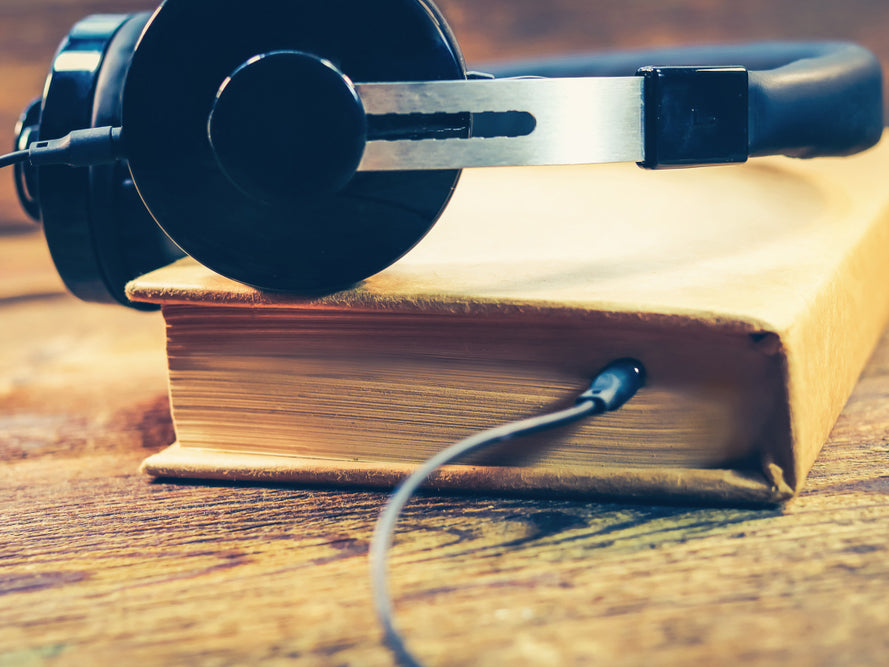The Great Audiobook Debate

Kristin Hannah, author of the excellent read, The Nightingale, has just released a new novel! The Great Alone is the story of a family in crisis and a young girl struggling to survive at the edge of the world, in America’s last true frontier.
Even though we don't assign books in Silent Book Club, when we heard the title we couldn't help but check it out. I mean, if there's ever a book to read silently among friends, one called The Great Alone would be it. So we were delighted when our friends at Macmillan Audio offered to give away TEN free audiobooks to SBC members. (Details below.)
A few times a week, a conversation thread about audiobooks crops up in Silent Book Club’s Facebook group. A member will be extolling the virtues of a recent release, or someone might ask for recommendations for a family road trip. Suggestions will pour in from readers all over the world.
But almost inevitably, some commenter will raise an objection to audiobooks being considered “real” reading. They’ll argue the semantics of listening versus reading, or make sweeping proclamations that people should not be “allowed” to count audiobooks toward their yearly reading goals. Call the Goodreads police, we have an intruder!
What is it about book formats that gets readers so worked up? Whether it’s print vs. ebook, listening vs. reading, abridged vs. unabridged, or translation vs. original, everyone seems to have some opinion on how we should consume stories. As if there’s a right and a wrong. Is it because we’re conditioned in school at an early age to see reading as a quantitative, measurable skill? Will there be a test? Are we grading on the curve?
Or maybe it’s because avid readers are so passionate about books, we feel the need to defend their honor like a medieval damsel in distress. But put down the swords, Sir Gawain. Books are doing just fine on their own. Audiobooks in particular.
For the past four years, audiobook sales have been exploding. The Audio Publishers Association estimates that audiobook sales in 2016 totaled more than $2.1 billion, and the number of audiobooks purchased increased 33.9 percent over 2015. Last year, audiobook listeners surveyed by the APA read or listened to an average of 15 books, and 77 percent of frequent listeners agreed or strongly agreed that “audiobooks help you finish more books.”

That experience mirrors what we hear from Silent Book Club members, who are some of the biggest book addicts around. In a recent thread, more than 200 readers weighed in on their feelings about audiobooks. The response was overwhelmingly positive.
Most members reported that they like audiobooks because they can listen while multitasking—sewing, knitting, cleaning the kitchen, painting a room, pulling weeds, going on long walks, doing laundry, working, exercising at the gym, jogging, and above all, commuting. As Kat DeBurgh writes, “since it’s generally frowned upon to read a physical book while driving a car, I find audiobooks to be helpful.”
The swell of interest in audiobooks over the past few years can largely be attributed to the rise in popularity of podcasts and streaming devices. More than a third of the world’s population now owns a smartphone, and in North America alone, about 230 million people have an entire library of digital books at their fingertips. Thanks to apps like Overdrive or Hoopla, which allow you to check out ebooks and audiobooks from your library for free, or paid subscription services like Audible or Libro.fm, access to books has never been easier. And that’s a game-changer for some readers.
As the mother of two children under 2 with a husband away at military training, Debora Clary found it nearly impossible to find time for reading. Then she discovered audiobooks. “I’m so happy I did,” she shares. “I’ve listened and finished four audiobooks since I started in the beginning of January and am on number five which I’m pretty sure I will finish tonight. If it wasn’t for audiobooks I wouldn’t get any reading done so I’m very thankful for them. I feel the same emotions I would if I were to sit down and actually read [the book].”
Slowly but surely, the perception of audiobooks is changing for the better. We frequently hear from readers that they have had a change of heart about audiobooks. As SBC member Ruby Roff explains, “for many years I was firmly in the ‘against audiobooks’ camp. A few years ago, my commute to work became very long and stressful and I tried it as a means of passing the time. Now I don't know what I'd do without them.” Audiobooks make it possible to read even more books, which can only be a good thing.
It’s time to put an end to the arguments about what makes a “real” book, once and for all. Whether you're using your retinas to process words on a page, or absorbing sound waves through your ear drums, your brain is traveling to the same destination.
Books transport you to an imaginary world created by another human being; they create a shared emotional journey that you experience with characters who don’t come to life until they enter your mind. That is pretty miraculous. So let’s stop bickering about modes of transportation and just enjoy the ride.
Enter for a chance to win The Great Alone on audiobook CD!
About the book
In 1974, Leni Allbright’s volatile, unpredictable father, Ernt, a POW, loses another job. He makes an impulsive, desperate decision: the family heads north, determined to live off the land in a spectacular wilderness.
At first, Alaska seems to be the answer to their prayers. But as winter approaches and darkness descends on Alaska, Ernt’s fragile mental state deteriorates and the family begins to fracture. Soon the perils outside pale in comparison to threats from within. In their small cabin, covered in snow, blanketed in eighteen hours of night, Leni and her mother learn the terrible truth: they are on their own. In the wild, there is no one to save them but themselves.
Click here to enter for a chance to win The Great Alone audiobook!


